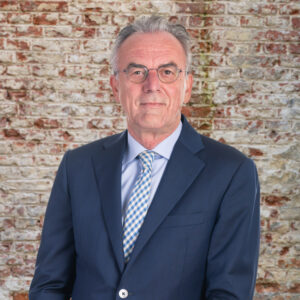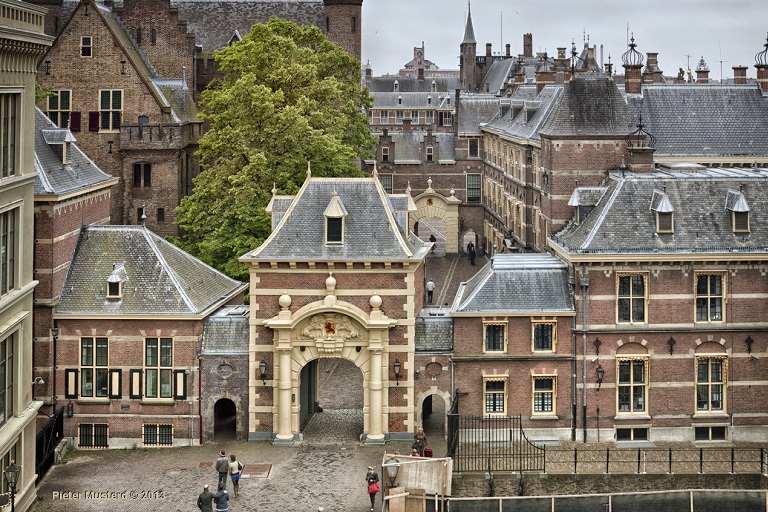First, can you tell us a little more about your career?

I started in marketing and sales at Esso Chemicals (now ExonnMobil) from my background as a chemist. That was more than 50 years ago. From Esso, I transferred to the Ministry of Economic Affairs, where a Directorate General for Industry was set up at the time. Indeed, in the 1980s we were going through a major economic recession. That caused major problems in industry. With seven other chemists, I eventually ended up at the ministry. The link from chemist to policy officer may be a bit difficult to make as an audience member. To be honest, I never considered myself a brilliant researcher, although I really loved the lab. Moreover, I had many friends in The Hague who supported CDA politicians there. As a result, I myself became politically active in Amsterdam with the Anti-Revolutionary Party (ARP). From that point of view, a position at the ministry seemed like a good fit for me. One of my first tasks became researching resource diversification.
My beta background has always served me well at the ministry, but I also found the political administrative game extremely interesting. After some time, I switched from Economic Affairs to Foreign Economic Relations. From that post, I organized trade missions to support contacts with companies. That's how I got to know business and industry very well. Eventually, I also became Director of Asia and Oceania there.
Somewhat later I made the move to the Ministry of Infrastructure and the Environment where I worked as Director General of Water and as Director General of Maritime Affairs. As DG Water, my technical knowledge came in handy again. After all, it is a very technical position, where you have to understand risk analysis well. We were then busy with the issue of water safety at the ministry. For that, we went to Japan and Vietnam, for example, to see how they dealt with the threat of water there. As DG Aviation, I had a lot of contact with the business community. There I learned from Hans Alders (read: former PvdA MP and Minister of Housing, Spatial Planning and the Environment (1989-1994)) the importance of public-private policy. We then set up the first dialogue table so that we could shape a supported environmental policy around Schiphol.
Sounds like a broad career?
That is certainly true! There's a lot of hopping in government, and there's also a close look at your competencies and experience.
Eventually, by the way, I did return to the Ministry of Economic Affairs as Director General of Energy, Telecom and Competition. There again, my beta background played a role. Meanwhile, of course, I had also gained extensive experience in Brussels, which also comes in handy in such a position. This brings me to the end of my career. The last few years I worked as a top consultant at ABDTOPconsult. A very diverse job. I dealt with subjects ranging from the deployment of interpreters in the asylum chain to the design of transition-oriented procurement policy.
So how did you end up here?
I still know René Leegte from my civil service days as DG Energy. Back then I supported Henk Kamp and René would often drop by when I was sitting on the civil servants' bench in the Chamber. Then I ran into him again at Springtij and so it happened. Henk Kamp liked it when we kept in touch with MPs and René was always a social MP.
Definitely politically engaged, then! Your Work at PZ also has a political character, what is it like for you to be involved in politics in this capacity?
In ministry, of course, you act out of the minister's interest and promoting policy development. Here I am free to advise from the other side of the table. But fundamentally, it's not very different for me. In essence, you're trying to get a keen sense of how best to develop strategies and then land them. But implementing and making sure a strategy eventually comes to life is also very important. For that you have to be able to think vicariously. You have to be able to estimate what the party where you want to get something done, for example a minister or a coalition party, is able to accept from you. If you can assess that well and empathize with others, then you can consider in advance how far you can go. Push the boundaries a little bit.
That does indeed sound recognizable. Is that also how you see the role of Publieke Zaken ? As a bridge builder between business and politics?
Exactly, because you can empathize with both worlds - the political and the commercial - you can properly assess what is a viable strategy to serve your interest. You have to explore the boundaries but also be able to assess them well. That is what good advice is ultimately based on. Never set unachievable goals or raise unachievable expectations.
That's great advice to give to the team. What is actually your first impression of the team at Publieke Zaken?
I see a lot of bright, dedicated, young people here with broad interests. Actually very similar to the young policy officers I have seen coming into the ministry. Moreover, I see that you enjoy, if I may call it that, the game. I see a dedication to the public good that I see more and more in society, by the way. Such dedication to the public interest is really necessary in this line of work and thus a huge advantage for you as an office.
Sure. That said, there are also challenges within the profession. What do you identify as the biggest challenges in public affairs?
I think setting achievable goals. And being able to estimate well what result you can achieve for your client. As a consultant, you must always be transparent about that and you must be able to manage expectations. Moreover, you must have self-control and be able to indicate when something is not feasible in the current context. Don't just give in to your client's whims or wishes, but present a realistic picture. That is exactly how we at the ministry occasionally had to keep a minister in line. To do that, you have to be able to counteract sometimes. That applies to a minister, but also to a client.
Is that one of the big lessons you learned during your career?
Absolutely. And you have to constantly keep asking yourself the question: am I still seeing it right?
You must always keep evaluating yourself and working to maintain the confidence of those you work for and with. That goes for directors and for consultants.
In short: trust, professionalism and transparency. This is also where I can guide young consultants. After all, you develop such values by gaining experience. Experience that I already have, and that I gladly pass on to you.
I think we would definitely benefit from that! Are there any other particular files, assignments or challenges you would like to take on at Publieke Zaken ?
I think the exciting thing for me remains advising on the border between government and business. Moreover, I have specific expertise in physical infrastructure, green industrial policy and water safety. I am also very interested in other forms of governance and decision-making, for example through citizen participation. A big question is how to do justice to such initiatives without sidelining politics. These are new questions about the relationship between citizens and government that I find extremely interesting. Hopefully, from my position at Publieke Zaken , I will find answers to them one day.


